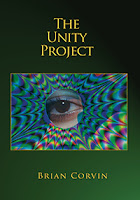The Unity Project, the title of the recently published second volume of poetry and verse by artist and poet, Brian Corvin, will be formally launched at The Irish Writers' Centre on Thursday, 6 October starting 6:30pm.
Brian’s first book, The Dream Journey, published in 2009, took him 50 years to write. This second volume has taken him just five years, which, he describes, as "progress of a kind". In The Unity Project, he sets out to complete the task that he set himself with his first outing.
The book takes its title from the long anchor poem contained within, itself inspired by the writings of Abdul Baha (1844-1921) who, over 150 years ago, put forward the view that 'the earth is but one country and mankind its citizens'. It was with the intention of exploring the ramifications of such ideas that set Brian Corvin on his own journey.
The conclusions that he has come to are set forward in the two volumes of poetry that have been published to date. They are also presented, in summary form, on a website that is being launched to coincide with the new publication. This, he hopes, offers a platform that can "develop and morph into a people’s power movement, which can and will work for real and fundamental change on three levels: the individual, the communal and the global."
The Unity Project by Brian Corvin is published by The Manuscript Publisher and available to buy online, in print and e-book editions. Further information is available from the websites of the author and the publisher.
Signed copies will also be available at the launch to take place at the Irish Writers' Centre on Parnell Square, Dublin on Thursday, 6 October starting 6.30pm. Make a note in your diary. Download your invitation here. For directions to the Irish Writers' Centre, see map.
 |
| The Unity Project by Brian Corvin |
Brian’s first book, The Dream Journey, published in 2009, took him 50 years to write. This second volume has taken him just five years, which, he describes, as "progress of a kind". In The Unity Project, he sets out to complete the task that he set himself with his first outing.
The book takes its title from the long anchor poem contained within, itself inspired by the writings of Abdul Baha (1844-1921) who, over 150 years ago, put forward the view that 'the earth is but one country and mankind its citizens'. It was with the intention of exploring the ramifications of such ideas that set Brian Corvin on his own journey.
"I wrote the poem, The Unity Project, about the next step in our evolutionary development, to give voice to my beliefs and hopes for a better world," says Brian.
The conclusions that he has come to are set forward in the two volumes of poetry that have been published to date. They are also presented, in summary form, on a website that is being launched to coincide with the new publication. This, he hopes, offers a platform that can "develop and morph into a people’s power movement, which can and will work for real and fundamental change on three levels: the individual, the communal and the global."
The Unity Project by Brian Corvin is published by The Manuscript Publisher and available to buy online, in print and e-book editions. Further information is available from the websites of the author and the publisher.
Signed copies will also be available at the launch to take place at the Irish Writers' Centre on Parnell Square, Dublin on Thursday, 6 October starting 6.30pm. Make a note in your diary. Download your invitation here. For directions to the Irish Writers' Centre, see map.







